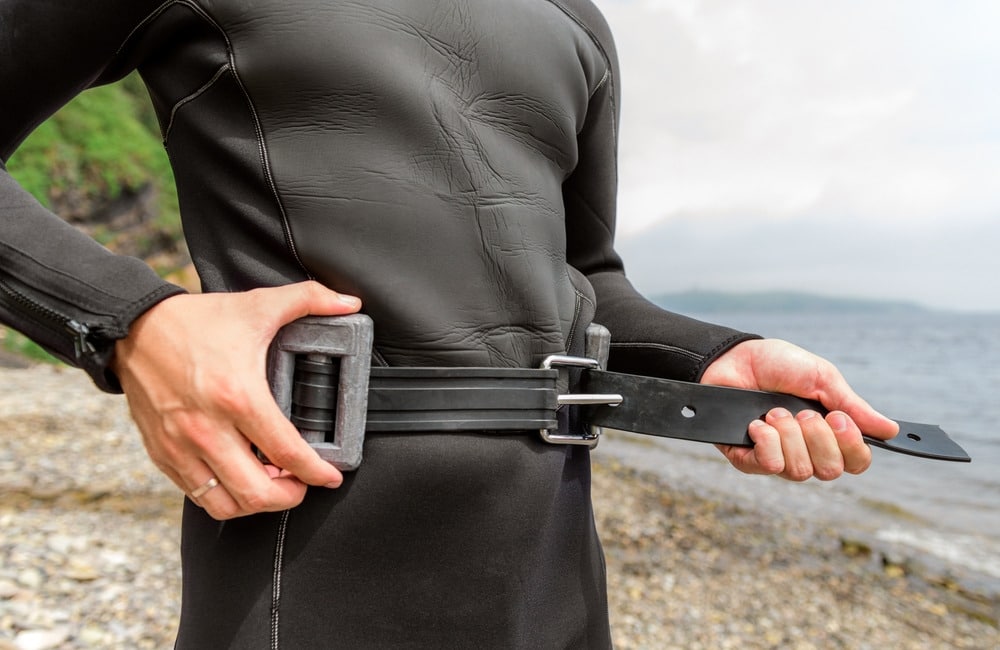If you’ve ever wondered why scuba divers wear a belt with weights around their waist, you’re not alone. A scuba diving weight belt plays a crucial role in helping divers achieve proper buoyancy control underwater. But what exactly does it do, and why is it so important?
Let’s explore what a weight belt is used for and why it’s an essential piece of dive gear.
Why Divers Need Weights
Humans are naturally buoyant in water, meaning we float. Add in the buoyancy of a wetsuit, which traps air to keep us warm, and the flotation effect increases even more. For scuba divers, this buoyancy needs to be offset to descend, stay underwater, and control position in the water column.
Weights allow divers to counteract this positive buoyancy, making it possible to achieve neutral buoyancy—that perfect balance where you neither sink nor float. Without added weight, it would be difficult (if not impossible) to descend and stay at depth during a dive.
What Is a Scuba Diving Weight Belt?
A scuba diving weight belt is a belt worn around the waist that holds weights—usually made from lead—distributed evenly to help balance the diver underwater.
There are a few common types of weight belts:
- Traditional webbing belts: Made from nylon with hard lead weights threaded onto the strap.
- Pocket-style belts (soft belts): Contain pouches filled with small lead shot or soft weights, offering more comfort and flexibility.
Both types serve the same purpose but may feel different depending on diver preference and body type.
How a Weight Belt Works Underwater
A weight belt works by adding the right amount of weight to offset your body’s natural buoyancy and the extra buoyancy from your exposure suit.
When properly weighted, you can:
- Descend easily at the start of the dive
- Maintain neutral buoyancy at depth
- Stay safely at your safety stop without floating up
- Achieve controlled ascents without fighting positive buoyancy
The goal is not to make you sink uncontrollably but to help you reach a neutral state where small adjustments with your BCD keep you perfectly balanced in the water.
How Much Weight Do You Need?
The amount of weight you need varies based on several factors, including:
- Body composition: Fat is more buoyant than muscle.
- Exposure suit thickness: Thicker wetsuits create more buoyancy.
- Saltwater vs freshwater diving: Saltwater increases buoyancy.
- Dive equipment: Some gear affects overall buoyancy.
The best way to determine the right weight is by performing a weight check at the surface. This involves floating at eye level with an empty BCD and holding a normal breath. If you sink when you exhale, you’re properly weighted.
You can explore different weighting options and find the right scuba diving weight belt setup to suit your diving needs and comfort.
Alternatives to a Weight Belt
Not all divers use a traditional weight belt. Some alternatives include:
- Integrated weight systems: Built into the BCD, allowing weights to be carried in pockets rather than around the waist.
- Weight harnesses: Useful for divers with back problems or those carrying large amounts of weight.
Each system has its pros and cons, but many recreational divers still prefer the simplicity and adjustability of a belt.
Safety Considerations When Using a Weight Belt
Weight belts are designed with safety in mind. One of the most important features is the quick-release buckle, allowing the diver to ditch the belt in an emergency to regain positive buoyancy and float to the surface.
It’s essential to:
- Practise removing the belt in a controlled environment
- Ensure the belt fits snugly around the hips to prevent slipping
- Always wear the belt over the BCD so it’s accessible for release
Proper training and familiarity with your equipment help ensure safe diving practices.
In Summary
A scuba diving weight belt is more than just a strap with weights—it’s a vital tool for achieving balance and control underwater. By helping you counteract buoyancy, it allows you to descend, hover, and ascend safely and comfortably.
Choosing the right amount of weight and the right style of belt is key to improving your diving experience. If you’re new to diving or looking to adjust your setup, consult with an instructor or dive professional to get it right.

